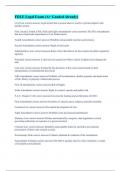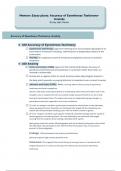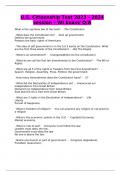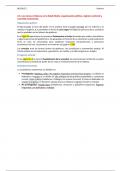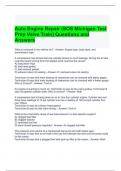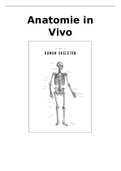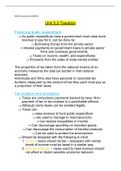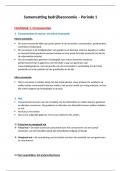The rise of Afrikaner nationalism
Political issues had a more significant influence on Afrikaner unity than cultural
issues.
Critically evaluate this statement in the context of the rise of Afrikaner
Nationalism.
The rise of Afrikaner nationalism was incumbent on Afrikaners attitudes towards, reactions to and engrained social
identity of class. A mutual understanding of the importance of class structure was a foundational way that Afrikaner
mobilised their separate factions, joining together to battle against British imperialism and prospect of black
domination.
Afrikaner nationalism developed in context of defeat by British in SA War and experience of British
brutality/concentration camps – the ‘problem’ of poor landless whites had been an issue since end of SA War –
1924 Nationalist government comes into power – affirmative action for white workers particularly benefitted poor
Afrikaners. Formation of Afrikaner unions during 1920s. During the 1930s depression large numbers of white
Afrikaners were unemployed and sense of Afrikaner nationalism grew in context of economic crisis’.
The Afrikaner Broederbond was a secret society formed in 1918, which was based at first in the Transvaal and Free
State. In 1934 Dr Malan and other important Afrikaner political leaders joined the Broederbond. Members of the
Broederbond soon got important positions in political, cultural, educational, and economic institutions.
Broederbond exercised a strong ideological influence on large sectors of the Afrikaner people. It influenced the
political and economic activities of the Afrikaner people.
In 1929 the Broederbond formed the FAK (Federasie van Afrikaanse Kultuur Verenigings) as a "public” front
organization. It functioned as an umbrella body that co-ordinated and guided the work of Afrikaner cultural groups.
During the 1930’s FAK grew into a large amid influential organization with about 300 affiliates. Cultural bodies,
youth and student organizations, church and educational groups operated within FAK. FAK committees also played
an important role in developing the Afrikaans language.
In 1938 the FAK organized a big celebration of the centenary (100th anniversary) of the Great Trek. Nine ox-wagons
like those used by the Voortrekkers of 1838 travelled from Cape Town to Pretoria. They visited many towns along
the way. In each town celebrations were held with the people dressing up as Voortrekkers and street names being
named after Voortrekker leaders. This ox-wagon journey ended in a mass meeting of 100 000 people near Pretoria,
where the foundation stone of the Voortrekker Monument was laid on 16 December. General JC Kemp renamed
Roberts Heights (the military headquarters in Pretoria) as Voortrekkerhoogte. In 1998 Voortrekkerhoogte was
renamed to Thaba Tshwane.
The Ox-wagon trek of 1938 contributed a great deal to revival of Afrikaner nationalism. Leading Afrikaners met in
Bloemfontein and formed the Ossewa Brandwag (OB). Colonel CJ Laas became the first leader of OB. OB was a
cultural organization that became very popular. OB came into operation with the following aims: Preserve the
language and traditions of the Afrikaner nation. Keep alive the ideals of the Great Trek Foster patriotism and
national pride among Afrikaners The OB called for a Christian national state. Members of the OB saw a connection
between Hitler's Herrenvolk (master race) and their own white superiority ideas. Later it developed into a pro-Nazi
organization during World War II
In 1939 Dr Kestell formed the RDB Reddingsdaadbond to uplift Afrikaner poor whites and to promote Afrikaner
business interests. Their main task was to create an ‘economic consciousness’ among the Afrikaner masses so that
they would support Afrikaner owned banks, insurance companies, shops, and other businesses. Established trade
and secretarial schools to teach skills to young Afrikaner workers were established. The RDB established an
Employment Bureau to find work for young Afrikaners with Afrikaner companies.
After the national party won the election, it brought in its policy of apartheid. The policy was strictly implemented
and aimed at the complete geographical, social, educational, and workplace separation of all races.
Political issues had a more significant influence on Afrikaner unity than cultural
issues.
Critically evaluate this statement in the context of the rise of Afrikaner
Nationalism.
The rise of Afrikaner nationalism was incumbent on Afrikaners attitudes towards, reactions to and engrained social
identity of class. A mutual understanding of the importance of class structure was a foundational way that Afrikaner
mobilised their separate factions, joining together to battle against British imperialism and prospect of black
domination.
Afrikaner nationalism developed in context of defeat by British in SA War and experience of British
brutality/concentration camps – the ‘problem’ of poor landless whites had been an issue since end of SA War –
1924 Nationalist government comes into power – affirmative action for white workers particularly benefitted poor
Afrikaners. Formation of Afrikaner unions during 1920s. During the 1930s depression large numbers of white
Afrikaners were unemployed and sense of Afrikaner nationalism grew in context of economic crisis’.
The Afrikaner Broederbond was a secret society formed in 1918, which was based at first in the Transvaal and Free
State. In 1934 Dr Malan and other important Afrikaner political leaders joined the Broederbond. Members of the
Broederbond soon got important positions in political, cultural, educational, and economic institutions.
Broederbond exercised a strong ideological influence on large sectors of the Afrikaner people. It influenced the
political and economic activities of the Afrikaner people.
In 1929 the Broederbond formed the FAK (Federasie van Afrikaanse Kultuur Verenigings) as a "public” front
organization. It functioned as an umbrella body that co-ordinated and guided the work of Afrikaner cultural groups.
During the 1930’s FAK grew into a large amid influential organization with about 300 affiliates. Cultural bodies,
youth and student organizations, church and educational groups operated within FAK. FAK committees also played
an important role in developing the Afrikaans language.
In 1938 the FAK organized a big celebration of the centenary (100th anniversary) of the Great Trek. Nine ox-wagons
like those used by the Voortrekkers of 1838 travelled from Cape Town to Pretoria. They visited many towns along
the way. In each town celebrations were held with the people dressing up as Voortrekkers and street names being
named after Voortrekker leaders. This ox-wagon journey ended in a mass meeting of 100 000 people near Pretoria,
where the foundation stone of the Voortrekker Monument was laid on 16 December. General JC Kemp renamed
Roberts Heights (the military headquarters in Pretoria) as Voortrekkerhoogte. In 1998 Voortrekkerhoogte was
renamed to Thaba Tshwane.
The Ox-wagon trek of 1938 contributed a great deal to revival of Afrikaner nationalism. Leading Afrikaners met in
Bloemfontein and formed the Ossewa Brandwag (OB). Colonel CJ Laas became the first leader of OB. OB was a
cultural organization that became very popular. OB came into operation with the following aims: Preserve the
language and traditions of the Afrikaner nation. Keep alive the ideals of the Great Trek Foster patriotism and
national pride among Afrikaners The OB called for a Christian national state. Members of the OB saw a connection
between Hitler's Herrenvolk (master race) and their own white superiority ideas. Later it developed into a pro-Nazi
organization during World War II
In 1939 Dr Kestell formed the RDB Reddingsdaadbond to uplift Afrikaner poor whites and to promote Afrikaner
business interests. Their main task was to create an ‘economic consciousness’ among the Afrikaner masses so that
they would support Afrikaner owned banks, insurance companies, shops, and other businesses. Established trade
and secretarial schools to teach skills to young Afrikaner workers were established. The RDB established an
Employment Bureau to find work for young Afrikaners with Afrikaner companies.
After the national party won the election, it brought in its policy of apartheid. The policy was strictly implemented
and aimed at the complete geographical, social, educational, and workplace separation of all races.


